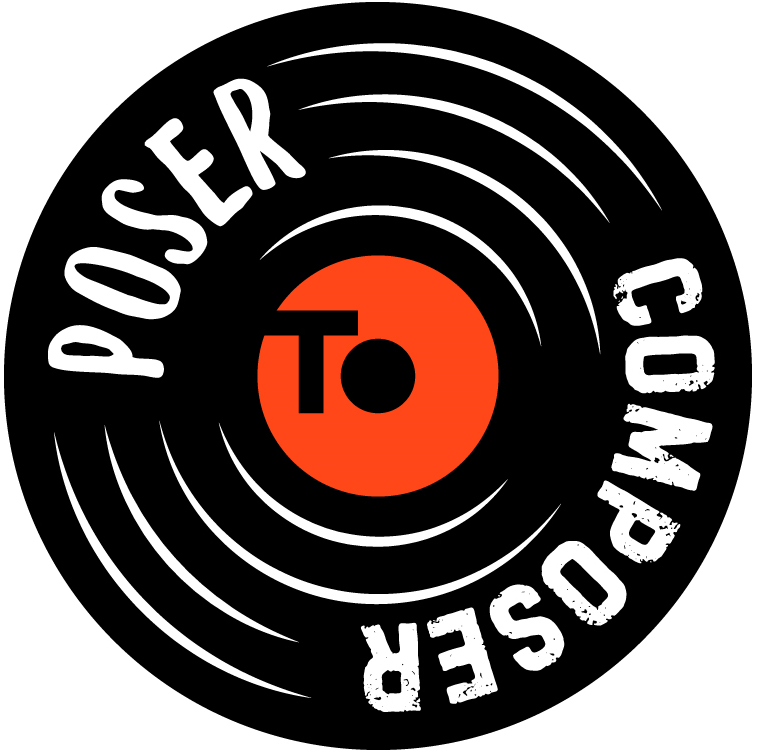My First Crack at the Composer Continuum

Last year I embarked on a personal project to learn enough music theory to compose a song. I’ve been blogging my progress (or lack thereof) and the many shiny distractions encountered along the way. Recently I wondered where I was towards being a composer. It got me thinking about the various pathways to becoming a composer and the minimum requirement to be a composer in the modern sense of the word. That was the genesis of the Composer Continuum.
I should mention here that the Composer Continuum is subjective, theoretical and speculative in nature, and words like "composer" and "music" mean different things to different people. I welcome your corrections, alternative interpretations and even slaps upside the proverbial skull if I got it really wrong.
Where was I? Yes, composers. I decided that anyone who conceives of original work and sees it through to completion is a composer, at some level or another. I don’t consider indicators like record sales, number one hits or influence because they can be gamed. I also don’t include innate abilities like creative genius because it’s not essential to composing music, although it does help you get recognized.
The technical proficiency of an instrument is or similar skill is cautiously factored in because the better one knows and can play their instrument, the more likely they are to elevate their art form.
Basically, I made it so all levels of the Composer Continuum are attainable with enough time, practice and experimentation.
So here's a quick primer on the Composer Continuum (a very basic version). I'm going to use it to compare my progress against well-known composers of various kinds. Please note that the Composer Continuum is to be read from the center up, and from left to right.
As you can see, I start at "Poseur". I currently don’t have the skills to compose music, although that shouldn't (and won't) stop me from trying :)
Level 1
The first level of composer (and the easiest to attain) consist of artist archetypes like Yoko Ono and Henry Rollins. To my limited knowledge, neither know music theory, play an instrument or can even sing. Yet both make music anyway. So the first milestone is to put something out there, no matter how unpolished.
Level 2
Level 2 has Frank Sinatra, Chuck D and Janis Joplin. None of them are musically-trained but all were focused on a particular style and/or genre, and took their craft seriously. To get here from level one is focus, and focused practice.
Level 3
The third level of composers, inhabited by archetypes like Ozzy Ozborne, Sid Vicious and Miles Davis, are those who play an instrument but not particularly well. They’re credited with songwriting (sometimes undeservedly) but leaned heavily on other band members throughout their careers. Miles Davis is the furthest along on this tier and even partially transcends this sphere because, while he wasn’t a great trumpet player, he knew how to pick his spots. The man needs his own bubble. No doubt there are other "transcenders" who cannot be contained on a single level, but none come immediately to mind.
It seems that getting from level 3 to 4 requires taking up an instrument and collaboration.
Level 4
This tier of composer (ala Brian Eno, Bjork and John Cage) has all the competencies of the first three levels. The big difference is they compose(d) in different mediums, with different tools, experimenting in different genres and even open entirely new genres. Attaining this level requires diversification and exploration.
Some artists are very focused on a particular style and spend very little time at this level. Others spend the majority of their career here. Either way, most artists never get past this level.
Level 5
The moat between level 4 and 5 is the mastery of their chosen instrument. Artists at this level are excellent musicians who have honed their skills and found a signature style or formula. Getting here requires years of dedicated practice.
Level 6
This is the specialization at a world-class level, as personified by the likes of Jimi Hendrix, Bill Evans, John Coltrane and Ravi Shankar. These elite musicians can compose and perform works that, to paraphrase Arthur C. Clark, are "indistinguishable from magic". Attaining this level requires a life-time of woodshedding with monk-like commitment.
Level 7
This musician-composer archetype doesn’t specialize in a single instrument but are prolific multi-talented multi-instrumentalists. They either work across numerous genres like Prince and Paul McCartney or in Fanny Crosby’s case, compose record-breaking volumes of hymns that are sung over a hundred years later. More study is required for me to understand how one might achieve this level.
Outliers
George Russell, Duke Ellington and JS Bach are multi-instrumentalists who can compose for numerous instruments in different genres. They also have made valuable contributions to music theory itself. They can be thought of as the conductors of all other musician-composer archetypes. More study is required for me to understand how one might achieve this level.
Again, this the a quick first version and many improvements are planned.

comments powered by Disqus